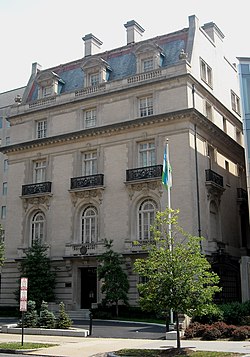Embassy of Uzbekistan, Washington, D.C.
|
Clarence Moore House
|
|

Embassy of Uzbekistan in 2008
|
|
| Location | 1746 Massachusetts Ave. NW Washington, D.C., U.S. |
|---|---|
| Coordinates | 38°54′30″N 77°02′26″W / 38.90833°N 77.04056°WCoordinates: 38°54′30″N 77°02′26″W / 38.90833°N 77.04056°W |
| Built | 1909 |
| Architect |
Bruce Price Jules Henri de Sibour |
| Architectural style | Beaux-Arts |
| Part of | Dupont Circle Historic District (#78003056) |
| NRHP Reference # | 73002076 |
| Significant dates | |
| Added to NRHP | April 3, 1973 |
| Designated CP | July 21, 1978 |
The Embassy of Uzbekistan in Washington, D.C., (also known as the Clarence Moore House and the Old Canadian Embassy), is the diplomatic mission of the Republic of Uzbekistan to the United States. The current ambassador of Uzbekistan to the United States is Bakhtiyar Gulyamov. The embassy is located at 1746 Massachusetts Avenue NW on Embassy Row in Washington, D.C., between Scott Circle and Dupont Circle. Constructed in 1909, the Clarence Moore House is an example of Beaux Arts architecture in blond Roman brick with limestone dressings; it was used by the Canadian government until the 1980s. The house was listed on the National Register of Historic Places (NRHP) on April 3, 1973. The building is also designated a contributing property to the Massachusetts Avenue Historic District and Dupont Circle Historic District, which are both listed on the NRHP.
Clarence Moore, a coal magnate from West Virginia and member of private clubs in Paris and New York City, chose the New York City-based architect Bruce Price and the Washington-based Jules Henri de Sibour to design his home in Washington, D.C. At the time, Sibour was a prominent architect of large residences in Washington, including the Thomas T. Gaff House, Andrew Mellon Building, and the ambassadors' residences of Portugal, France, and Luxembourg. Moore purchased the land from Edward J. Stellwagen for $37,422, and construction began in September 1906 and was completed in 1909. Moore only lived in the house for three years. On April 15, 1912, Moore was one of the 1,517 passengers who perished during the sinking of the RMS Titanic. After Moore's death, his widow, Mabelle, remarried and only used the home for diplomatic and social events.
...
Wikipedia
